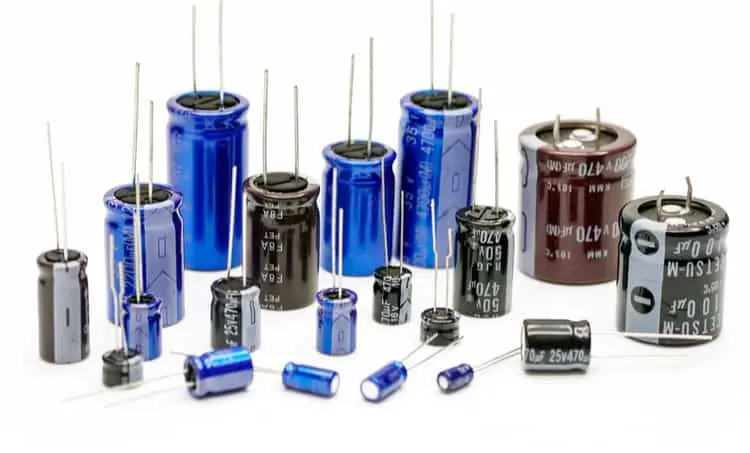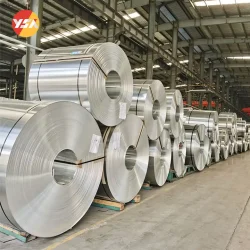Capacitor aluminum foil
Capacitors are electronic components that store and release electrical energy. The main difference between capacitor aluminum foil and regular household aluminum foil lies in their manufacturing processes and specific characteristics.

Purity
Capacitor aluminum foil is typically made from high-purity aluminum, often with a purity level of 99% or higher. This high purity ensures better electrical conductivity and reliability in capacitor applications.
| Alloy | Chemical composition |
| 1050 | (Al):≥ 99.50% |
| 1060 | (Al):≥ 99.60% |
| 1100 | (Al):≥ 99.00% |
| 1235 | (Al):≥ 99.35% |
Thickness
Capacitor aluminum foil is manufactured to have precise and consistent thickness. The thickness is usually specified in micrometers (μm) or microns. Our capacitor foils are available in a range of thicknesses.
| Alloy | Temper | Size/mm | |||
| Thickness(mm) | Width(mm) | ID.(mm) | OD.(mm) | ||
| 1060/1100 | O, H18,etc. | 0.001-0.01 | 20-1600 | 76 | 150-450, according to customer requirments |
| 152 | 450-700, according to customer requirments | ||||
Surface finish
Capacitor aluminum foil may have a specially treated surface finish to enhance its electrical properties. Surface treatments such as chemical etching or anodizing can be applied to improve the foil’s adhesion, corrosion resistance, and dielectric properties.
Mechanical properties
Capacitor aluminum foil is designed to have excellent mechanical properties, including high tensile strength and elongation. These properties allow the foil to withstand the stresses and deformations that occur during the manufacturing process and operation of the capacitor.
Electrical properties
Capacitor aluminum foil exhibits low electrical resistance and high capacitance per unit area. It is essential for the capacitor foil to have low electrical resistance to minimize power losses and enable efficient energy storage and discharge. Due to these specific manufacturing processes and characteristics, capacitor aluminum foils ensure reliable performance and efficient energy storage. It is not recommended to use regular household aluminum foil as a substitute for capacitor aluminum foil, as it may not meet the required specifications and could result in poor capacitor performance or failure.
Yongsheng Aluminum Foil
| Packaging | Seaworthy Export Standard Wooden Box |
| Sample | Free |
| Delivery Time | Ready stock 7-10 days, on time delivery guaranteed |
| Loading Port | Qingdao Port, Tianjin Port, Shanghai port. |
| Price Terms | FOB, CIF, CFR, EXW etc. |
| Payment | L/C, T/T, Western Union, etc. |
| Standards | ASTM-B209, EN573-1, GB/T3880.1-2006, GB/T 24001-2016, GB/T 19001-2016 |
| Certificates | MTC, ISO9001,SGS, ROHS,DNV,TUV,ISO14001,ABS,CCS,CE |
| Quality Control | Mill Test Certification is supplied with shipment, Third Party Inspection is acceptable. |
The Manufacturing Processes for Capacitor Aluminum Foil
The manufacturing processes for capacitor aluminum foil are specialized to meet the specific requirements of capacitor applications.

Alloy selection
High-purity aluminum alloys with specific composition and impurity levels are chosen to ensure excellent electrical conductivity and stability. Such as 1060 or 1100 aluminum alloys.
Casting
The manufacturing process often starts with the casting of the aluminum alloy. Molten aluminum is poured into a continuous casting machine, where it solidifies into thin sheets or coils of the desired thickness.
Rolling
The cast aluminum sheets are then subjected to a rolling process to reduce their thickness to the desired gauge. This involves passing the aluminum through a series of rolling mills, which gradually reduce the thickness while improving the foil’s mechanical properties.
Annealing
Annealing is a critical step in the manufacturing process. The rolled aluminum foil is passed through an annealing furnace, where it is heated and then gradually cooled to relieve internal stresses and improve the foil’s mechanical strength and formability.
Surface treatment
Capacitor aluminum foils undergo surface treatments to enhance its performance. This includes chemical etching or anodizing processes to modify the foil’s surface properties, such as adhesion, corrosion resistance, and dielectric characteristics.
Slitting and cutting
After the foil has undergone the necessary treatments, it is slit and cut into the desired width and length. We support customization according to the specific requirements of capacitor manufacturers.
These specialized manufacturing processes ensure that the capacitor aluminum foil meets the stringent requirements for electrical conductivity, mechanical strength, and stability in capacitor applications. The precise control of alloy composition, thickness, surface treatment, and quality control throughout the manufacturing process is essential to produce high-quality capacitor aluminum foil.


